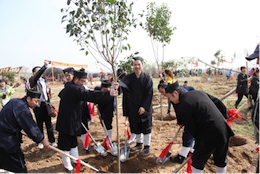Daoist ecological herbal nursery and sustainable calligraphy ink initiative
July 27, 2015:
 |
 |
 |
Planting the herbal garden |
See below for sustainable ink initiative
Earlier this year, Daoist monks at Zhengyang temple in Xianyang, Sha'anxi province inaugurated an Ecological TCM Herbal Nursery. This is the third Ecological TCM Herbal Nursery in China, and is an important step in raising awareness of the ecological consquences of TCM throughout the country.
Local residents and Taoist masters together planted the first batch of 1000 seedlings in the ground, which include lingustrum compactum, or wax-leaf privet, a commonly used ingredient inTCM for its pain-killing and pacifying effect and ginko trees, also widely used in TCM and cosmetics.
Over 500 people, including religious leaders, TCM company representatives and municipal officials participated in the opening ceremony and applauded the project's significance. Director of the office for TCM resources in Shaanxi University of Chinese medicine, Dr. Bai Qingji delivered a presentation. President of Xianyang Daoist Association and abbot of Zhengyang Temple, Master He Xinping thanked everyone for their effort in reviving the spirit of Daoist medicine in helping with our environmental problems today.
Traditionally, Daoists are practitioners of TCM (Traditional Chinese Medicine) and Daoist temples are places where people would go to seek for treatment. In the past Daoists doctors would collect their ingredients locally or grow their own in their carefully tended herbal gardens in and around Daoist temples.
This tradition has died out in recent years, and Daoist temples have mostly forgotten the techniques longer grow TCM herbs. Since last year, however, we are funding Taoist temples to revive this tradition and encourage the use of herbs as an alternative for animal ingredients in TCM.
For more than a decade Daoists in China have campaigned for rare and endangered animal parts to be entirely replaced by plants. They argue that plant ingredients work just as well: and that additionally, since the TCM health system is about harmony, an ingredient that causes disharmony in the universe could be actually dangerous.
In order to bring back this spirit of harmony in TCM, and help encourage the use of herbal ingredients, ARC and the Valley Foundation worked with the Daoists to encourage the rebuilding of TCM herbal gardens around Daoist temples.
“We had three goals when we launched the TCM Herbal Nursery project,” said Martin Palmer, Secretary General of ARC. “First we want to promote herbal ingredients as an effective medical replacement of animal ingredients like rhino horn, ivory and tiger bones.”
“Second we want to grow indigenous trees and plants like ginko trees that are commonly used but rare in order to protect the species in the wild.
“And third, we want to encourage the cooperation and interaction between Daoist temples, TCM companies and local residents. The aim is to help them form an ecological alliance with Taoist temples supplying herbs to TCM companies, with some of the profits used by Daoist TCM doctors to treat local residents free of charge.”
Since 2014, the Daoist Ecological Temple Network, assisted byARC and Valley, has helped Daoist monasteries build three herbal nurseries: in Ziyang, Louguan and now in Xianyang.
Already in Ziyang and Louguan partnerships started to emerge between these temples and local TCM companies such as Taiji.
“More and more temples are discussing about the possibility of opening herbal gardens around their temples,” said ARC’s head of Chinese programmes He Yun. “We hope in the future this network of TCM herbal gardens would continue to expand.”
Sustainable ink initiativeThe Daoists have teamed up with Yi De Ge, which is the most famous traditional ink producer in China, to make a new sustainable and vegetarian ink for calligraph.
This new ink is recognized as sustainable because its ingredients are made of plants. Whereas traditional Chinese ink uses animal ingredients, such as ox collagen (used as an animal glue), musk (which is endangered, used for its smell), Daoist ink is entirely plant-based.
The recipe includes the soot from pine wood, different kind of plant oil, and other plant extracts for the aromatic smell.
In the recent past, Japanese ink producers have also attempted to find replacement for the animal ingredients in Chinese ink; however their solution was to use chemical compounds that are harmful for the health in the long term.
Yi De Ge Daoist ink uses natural ingredient and poses no health hazard for its customers.
"It is an example of a Daoist effort to work with traditional businesses to save the endangered species and protect lives," said ARC's China Programme Manager, He Yun.
The Daoist Ecological Temple Network is a grass-root Daoist environmental movement established following the Daoist ecological declarations in Qinling and Maoshan, and after the China Daoist Association formally announced a Daoist Environmental Eight Year Plan in 2009. Currently it has over 50 temple members in different parts of China.
|

